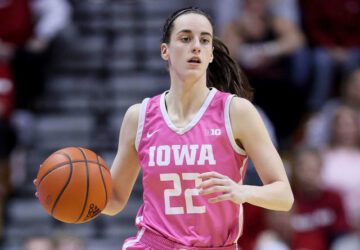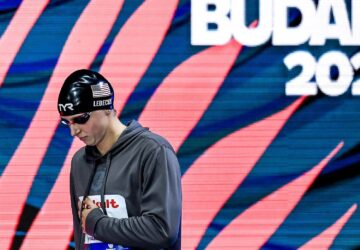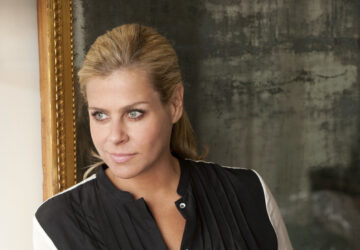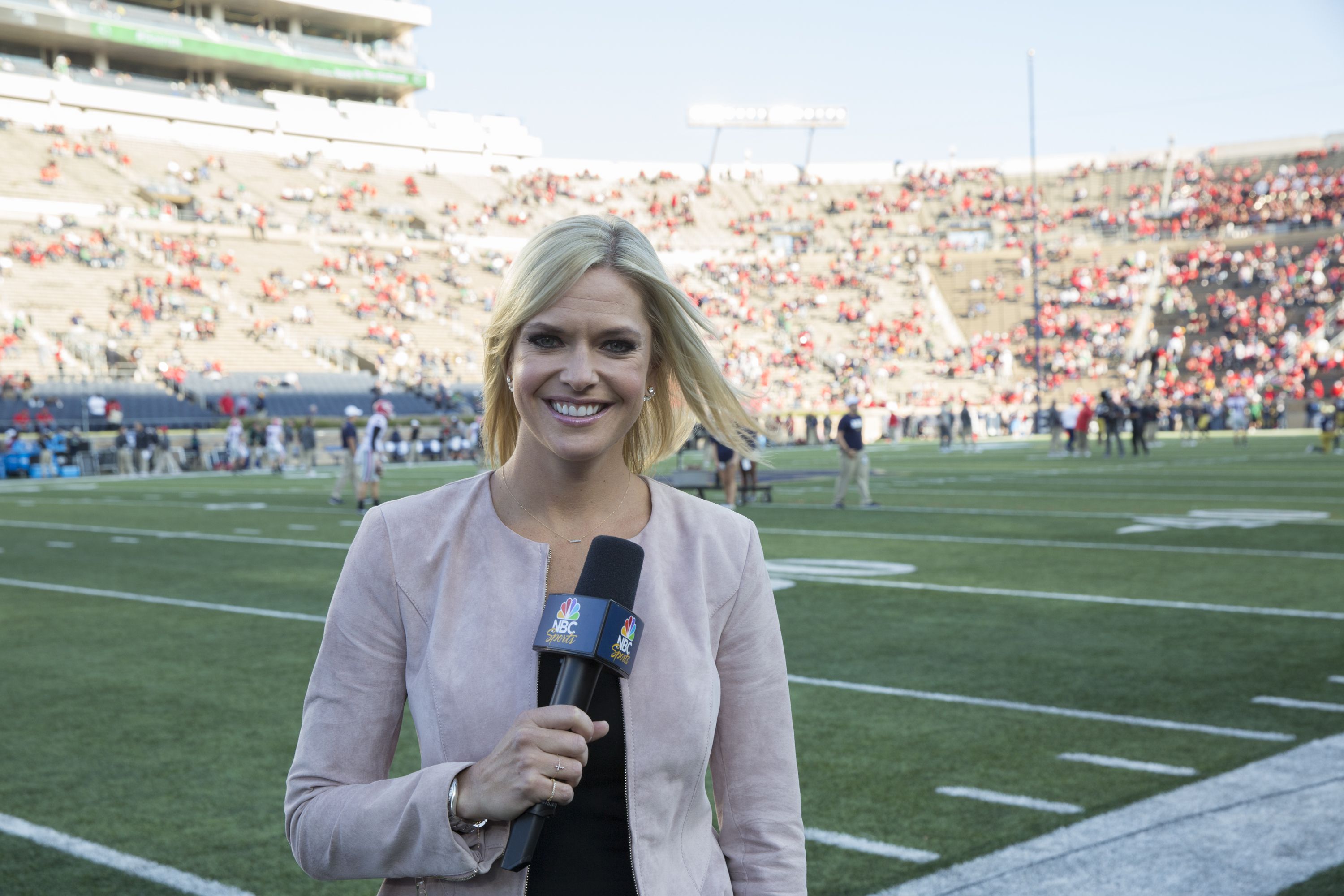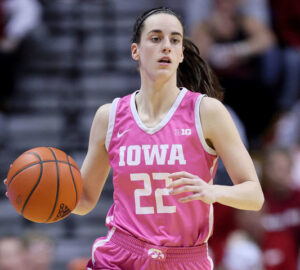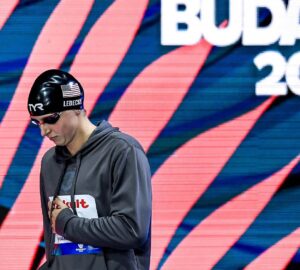Kathryn Tappen is a versatile reporter and host serving a variety of roles for NBC Sports. Kathryn covers the NFL, college football, golf and has covered multiple Olympics and was a mainstay on NHL broadcasts. In 2020 Tappen anchored studio coverage as part of the first ever all-female crew that broadcast and produced the Blues-Blackhawks matchup.
She has also worked with the NHL Network hosting NHL Tonight, New England Sports Network (NESN) and WJAR in Providence, Rhode Island as weekend anchor and weekday sports reporter. During her career, Tappen has been nominated for two New England Emmy Awards for sports reporting and won an Associated Press award in 2006 for her feature Swim Meet.
Tappen grew up in Morristown, N.J. and went to Rutgers, where she competed in cross country and track and field and majored in journalism. She was a four-time Academic All-American, Big East All-Star and at one point held the school record in women’s 3,000-meter steeplechase.
Interview Transcript:
Cameron: So, since this is a series on the 50th anniversary of Title IX, I wanted to ask what’s the one area you wish we made more progress under Title IX?
Kathryn Tappen: I am so grateful for the opportunities that Title IX afforded me growing up. I was able to participate and made friends in different sports. It allowed me to earn a college scholarship at a Division 1 school and provided me with all of these amazing opportunities. If you think about what women dealt with before Title IX, it’s amazing what they were able to achieve overcoming those odds. I think one area where we can grow in Title IX would be to provide the same world class facilities that men have. I think about the March Madness a few years ago when they showed the men’s locker room compared to the women’s locker room – it was eye opening. Another area I think we could grow is off the playing field. Title IX is so great at balancing the numbers game when it comes to men’s and women’s sports, especially at the collegiate level, but what about women who want to perform off the field? The scorekeepers, coaches, managers, support staff for the teams. There should be an equal opportunity in athletics in that regard as well. Not just the numbers of those participating on the field, but anybody who wants to pursue jobs in athletics.
Cameron: You were a very successful D1 college athlete at Rutgers and a great student. How did you find time to balance it all – did you have any fun or was it just training and academics?
Kathryn: I definitely had a lot of fun! You need to have fun with your friends, you’re only in college for four years. I am a very organized person by nature and always was growing up. I think when you’re trying to balance a curriculum and your academics, when you’re trying to set your goals towards your major and what you want to do after graduation, it’s hard to find time, so the key is to be organized. Sometimes you are doing double training sessions a day – morning workouts in the pool and afternoon workouts on the track or out running in cross country. Some days were really jammed, but you just had to find a way. During school nights, I was disciplined – I stayed home, did my homework and got ahead. I found that being disciplined helped in all areas of my life and it continues to now. It’s a juggling act, but I think it prepares you for life to be able to balance a lot on your plate at once.
Cameron: I totally understand. Something I realized as a student athlete is that you don’t really have that much time to procrastinate, so it’s very important to kinda force yourself to stay organized and on top of work.
Kathryn: Well you are a very accomplished athlete and a good student, so you know what it’s like when you want to achieve greatness for yourself and want to perform well in sports and in academics. You just find a way to do it, right?
Cameron: Yup. How similar is that competition mindset from athletics to your professional career? Do you see that discipline carry over into your work now?
Kathryn Tappen: Very much so. I work in a very competitive industry. I use a lot of my inner athlete strength to get me through number one, difficult times, but also number two, tough schedules. We went from the Super Bowl in Minnesota in 2014 straight to South Korea for two weeks of the Olympics and then came right back for a full week of NHL broadcasts. That was a four or five week stretch where I was all over the world, thinking “how am I going to do this?” I knew it was pretty daunting, but I had to table it back and say, ok let’s take it one day at a time. It’s very cliche, you hear Bill Belichek talk about it all the time – just take it one game at a time. It helps compartmentalize the overwhelming nature of what I do. Sometimes you think how am I going to get all of this done, but you find a way to pare it down. I am going to spend the first couple of hours of today with this, I can get through the end of the day with that. Slowly and surely you start to chip away at that vast amount of work. For me, I love the competition, I love live TV because I feel like I’m back competing in track. You get that same adrenaline rush. You get that excitement the way I would when the gun would go off at the starting line. It’s so fun. I think a lot of my background as an athlete has prepared me for the grueling, intense work.
Cameron: You said your job parallels back to when you were an athlete, and athletes must have rest days. What does a rest day now look like for you?
Kathryn Tappen: Well, a lot of times on the airplane I like to rest. On a day like today, I had a couple of meetings on Zoom for our Boston College-Notre Dame game, but I try to give myself an open schedule to take a break. I try to make sure I am getting stuff done with my house, go get lunch with a friend. I actually have to schedule in personal time, which I know sounds crazy. You can’t just assume that your Saturday is going to be available to go to a wedding or a shower or a friend’s birthday party. You have to schedule that in with all of the other activities you want to do. I am pretty good about making sure I take my down time. I love to read so I schedule time at night before I go to bed. I make sure I can turn the phone off, to turn on the “do not disturb” so I can recharge the batteries.
Cameron: When you decided to be on TV, were you trained or were you just dropped into the deep end? How did you learn?
Kathryn Tappen: Dropped into the deep end! I knew when I was a little girl that I wanted to do this. I remember in my eighth grade year book, I said I wanted to be a broadcaster. I loved public speaking and I love athletics so I thought this would be a great place for me. I went through four years of college studying journalism, but because of athletics I didn’t have a lot of time to dedicate to the Rutgers Television Network or the Rutgers Radio Network so I wasn’t getting hands – on experience on TV, in front of the camera or on radio. I was committed to three seasons of a sport – I did cross country in the fall and then indoor and outdoor track. My first job in television was really at NBC-10 in Providence, Rhode Island. It was the local NBC station, I worked weeknights and weekdays and I just learned. You just dive right in and figure it out. There was certain terminology I was unfamiliar with on live TV that I had to learn on the spot. I think it’s an industry and profession that’s better to learn hands-on than in the classroom. If you want to be an attorney it’s great to take debate classes or if you want to go into the financial world, it’s better to get a degree to manage other people’s money. For people on television it’s better to get those reps and make those mistakes. It’s better to make those mistakes in the smaller markets where there aren’t as many eyeballs watching, so when you get to the national level you’re ready to go.
Cameron: Can you talk a little about your process in terms of how you prepare for an event? Do you take the same approach in each sport or is it different?
Kathryn: I take the same approach in each sport. I think preparation is key. That is the number one thing I do not deviate from when I am preparing for a game or an Olympics or a broadcast. My preparation starts with a research package with articles and stories that give us a big picture story for the week. As the week goes on, I can start to check off boxes on my checklist and figure out which players and coaches I need to talk to for the game. Then I organize all of the information I get from those coaches and players. On Friday night, we have our production meeting at the hotel. I get to the stadium on Saturday and have the same pre-game routine. I talk to the people that I need to talk to for information and then you are ready to go. For each sport, the content might be different, but the day-to-day approach of reading my research and talking to people all stays the same.
Cameron: So when you’re on the sideline in football or talking to a player after a golf round, the interviews are very real time. How much time do you have to prepare the questions? Do you write down what you want to say or is it all from general notes?
Kathryn: It’s usually from my notes. I take pretty good notes during the game or a round. For example during a golf tournament, you’ve got four hours where you’re watching these golfers. Let’s say you know Rory McIlroy is having a great round and you want to talk to him afterwards. I know on the 17th hole that I am going to get him after his round, so I have about a hole and a half (15 to 20 minutes) before the interview. In golf, for the most part we know who we’re going to get. I look at the scorecard and see, “wow he made four birdies in a row” – which leads to a question. You can look at the trends in recent tournaments if he’s won 2 of his last 5, there’s a question. In golf, you have time. With football or hockey, the action happens a lot quicker and you have less time to prepare. If you’re in overtime you could be interviewing one of five people when that final touchdown is scored. I just prepare for a few players I’d want to talk to. It happens quickly and usually the best questions are the ones that happen at that moment. “You just scored the winning touchdown of the Super Bowl…describe how that play evolved” or “tell me what made that play work?” “How does this moment feel for you?” The preparation for these sports is quicker so you need to be on your toes.
Cameron: When you covered The Olympics, how long did it take you to prepare for all of the sports? That must have been an intense experience.
Kathryn: That is a challenge for all of us – producers and talent and directors – because we’re getting so many unknowns. It’s crazy, I remember my first Olympics was in Sochi. I bought a binder at Staples and I had every sport and every bio. The flight to Russia was 22 hours and I was going to read the whole thing. I sat down with my colleagues for breakfast and was slowly chipping away at it and they were like “what are you doing? This is too much, you are not going to need 90% of the information in that binder!” It was great advice because the reality is I was overpreparing. I was spending too much energy preparing for something I wouldn’t need. The most recent Olympics I was on site for – I was in Tokyo – I was a host and hosted 7 hours of live television. It’s a very similar thing, you are dipping in and out of sports, I have a researcher sitting next to me. If an athlete is performing well from another country and I want to pronounce their names I’ve got athlete pronunciation guides at my fingertips. Any American athlete that wins comes into the studio so I was able to have ten minutes and calibrate – what were they able to do, what does this accomplishment mean? They’ve been trying for four Olympics and were finally able to get a medal. So you’re watching all of the events and chipping away at all of the events. By the end of the Olympics you feel like you know all of them, but the key is to really not to over prepare. You don’t want to spend a lot of your energy with information you really don’t need.
Cameron You were part of the first ever all-female crew to broadcast an NHL game. We’ve seen other “non-traditional” broadcasts work like the Manning Cast with Peyton and Eli. Do you think we will see an effort to broaden out different points of views on TV in the future?
Kathryn: I do, I think we’re seeing that. I think telecasts like the Manning Cast, I know that Nickelodeon did a broadcast twice and they’ve got the Slime Zone. I actually love watching that. I usually watch them side by side and keep the sound up on the Nickelodeon broadcast and just keep an eye out for the real broadcast. I think the more we branch out, the better. We have the opportunity now with so many platforms. You could do a podcast while you’re watching a game. You can Tik Tok or Zoom. I think we’re going to see more of it in different sports. I’d actually love that because I think it’d be highly entertaining. What better way than getting the superstars talking about the sport they played for so long. I think now more than ever with all of the platforms to watch sports we’re going to see more and more of that.
Cameron: What do you think it will take to get more extensive coverage of women’s sports?
Kathryn: That’s a really good question, I was actually at Google last week speaking on a panel and was asked that question. Kylie Ohlmiller, who was on the same panel, came up with a great response. She said “as soon as we put it on TV, people are going to watch” so don’t have the fear of it having to take the place of a football game with 40 million viewers. I think we should just put it out there. We just had the very first college women’s basketball game on NBC last Saturday with Notre Dame and Cal. I thought to myself, it’s 2022, how have we not had a women’s college basketball on NBC before? Now that it’s out there, let’s see. With your question before, with more media outlets to put it on, the days of just CBS, NBC, ABC, Fox are over. We have Netflix, Amazon, Hulu, YouTube, so you have so many more places to put on women’s sports. It’s just a matter of putting it out there and seeing the response and getting the support of everyone watching.
Cameron: Based on how successful you have been at transitioning between roles and sports, do you want to broaden your career beyond sports media?
Kathryn: I would love to, yeah. That’s a great question. I have a lot of other interests, in particular I love home design and decorating. I’m currently building a home and would love nothing more than to do a show like Chip and Joanna Gaines or Dream Home Makeover on Netflix. If I can find a way to continue to cover sports but also do a show centered around home decorating, home design, home improvement, that’s what I would really want to do. I wouldn’t do it as my next career after sports – I would want to add it to what I am already doing with sports. Outside of sports I would want to use my platform, my talents in front of the camera and use it for something else. I think that would be fun.
Cameron: Finally, what’s one piece of advice you would give someone looking to go into the media business?
Kathryn: I think one piece of advice is to be prepared to work hard. Working hard in this industry puts you into challenging situations at very difficult times of the day and on the weekends. If you want to get into media, whether it’s news media or sports media, the schedule is very grueling because you’re not working conventional hours. It’s very rare you are going to work 9 to 5. If you are working on the morning news, you are in at 2 AM and working until 9 AM. If you are working in sports, you are working nights and weekends, which is very hard especially in the early part of your career. I remember as a young journalist missing out on a lot of things – family weddings and summer barbecues. I was working at NBC 10 doing the local news in my early 20s while my friends were having fun on the weekends and taking vacations. But fast forward twenty years later and I’ve got one of the coolest jobs of any of my friends – the hard work paid off. I think it’s important to work hard and educate yourself – continue to read and look at research materials. Stay true to yourself – with social media it’s easy to get distracted comparing yourself to other people. I say stay true to yourself because authenticity in media and journalism in particular on television is rare. I think a lot of people try to be someone they are not. If you can be authentic and truly deliver in a manner the audience is going to identify with, that’s a win-win for you.

